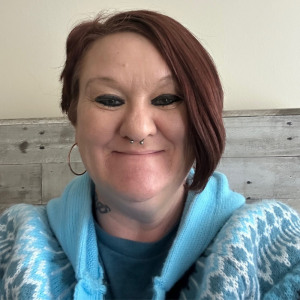From Prison to Purpose: Tabetha Smith’s Journey to Cybersecurity and Career Confidence
Life After Prison: Power of a Second Chance Series





Written by Natalie Medley, marketing support coordinator at Televerde Foundation
When Tabetha Smith walked out of prison just four months ago, the world felt unfamiliar. After eight years away, the rising cost of living, crowded places and uncertain job prospects could have easily overwhelmed her. But Tabetha had two powerful things working in her favor: preparation and support.
Today, Tabetha is a communications analyst at Aventiv Technologies, monitoring prison calls for safety and compliance while preparing to transition into the company’s IT department. Her sights are set on cybersecurity, and thanks to her own hard work and Televerde Foundation, she’s well on her way.
We sat down with Tabetha to learn more about her journey, the skills that helped her succeed and what fair chance hiring means to someone who simply needed a shot.
Q&A With Tabetha Smith
Q: Where are you working now, and what’s your role?
I’m working remotely for Aventiv Technologies as a communications analyst. I monitor prison calls, mostly from men’s facilities in Kentucky and Georgia, and flag any serious issues for internal affairs. I’ve been here for about a month, and I honestly love it.
Q: Did you ever expect to work in communications or tech?
Not at all. But before I left Televerde Foundation, I completed both the Cisco cybersecurity and Google cybersecurity certifications. I studied for nearly two years while incarcerated. Now that I’m getting state certified, Aventiv is planning to move me into their IT department. It’s exciting to see a path forward in a field I never imagined myself in.
Q: How did the job opportunity come about?
Chelsea Fields from Televerde Foundation reached out. She knew my background in call centers and thought I’d be a good fit at Aventiv. She helped with my résumé and advocated for me. I was hired two weeks later.
Q: What was the interview process like?
Honestly, I wasn’t too nervous because the PATHS program had prepared me. We did mock interviews with real managers from companies across the U.S. That made all the difference. I knew what to expect and how to present myself professionally.
Q: Has there been a turning point in your reentry journey?
Yes. Getting this job at Aventiv gave me stability and peace of mind. I’m no longer stressed about whether I’ll make ends meet. I’ve been able to reconnect with my seven kids and three grandkids. That’s probably my proudest achievement so far — rebuilding those relationships.
Q: What did the Televerde Foundation help you with the most?
They helped me rebuild my self-esteem and gave me the support I needed to start over. They set up my appointments, housing and even mental health care so I never felt alone. That made it possible for me to land my job at Aventiv, which gave me stability, peace of mind and the chance to reconnect with my seven kids and three grandkids. Building these relationships have been my proudest achievement so far.
Q: What would you say to employers considering second-chance hiring?
Don’t assume a felony defines who someone is today. Ask questions. Get to know the person. Most of us have done the work to change, and we’re some of the most dependable employees you’ll ever have.
Tabetha’s story shows what is possible when second chances meet determination. Thanks to partners like Aventiv Technologies, who make fair chance hiring part of their culture, families are reuniting and futures are being rewritten. This story is part of our ongoing Life After Prison: Power of a Second Chance series, highlighting real women reshaping their futures through fair chance employment.
Want to help rewrite more stories like Tabetha’s?
Learn more about our employer partnerships and how you can be part of a movement that changes lives through fair chance hiring.
